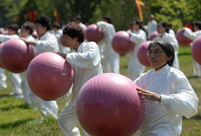 Amphibious armored vehicle unit conducts open sea drill
Amphibious armored vehicle unit conducts open sea drill
 Water relay in Henan
Water relay in Henan
 Ethnic culture feasts eyes of travelers
Ethnic culture feasts eyes of travelers
 80 security dogs assembled in Nanjing police dog training base
80 security dogs assembled in Nanjing police dog training base
 Graffiti artists paint on street walls in Xinjiang
Graffiti artists paint on street walls in Xinjiang
 Story of ceramic artist Zhang Lingyun
Story of ceramic artist Zhang Lingyun
 Magic summer night dream in Hongyuan
Magic summer night dream in Hongyuan
 Incredible creatures in headwaters drainage region of Lancang River
Incredible creatures in headwaters drainage region of Lancang River
 The future of rock n' roll seen in young rockers in China
The future of rock n' roll seen in young rockers in China
 Magnificent Yanziya Cliff
Magnificent Yanziya Cliff
Western media are reading too much into the anti-trust investigations launched by Chinese authorities in recent days. Shen Danyang, a spokesman at China’s Ministry of Commerce, said that the lawful investigations into alleged monopolistic activities will promote fair competition and protect the rights of consumers. Any domestic companies and foreign-funded companies that violate the anti-trust law will be punished.
Quasi-monopolies such as Qualcomm and Microsoft are involved in the anti-trust raid. According to the anti-trust investigations, these powerful companies dominate the market and block competition by taking advantage of their finances, technology and intellectual property. Some experts say that the “super-national treatment” that foreign-funded companies have enjoyed has helped them corner the market. In the early years of opening-up and reform local governments competed against each other in implementing preferential policies, such as free or low-cost use of land and tax exemption, to woo foreign investors. At the time China did not have adequate supervision of monopolistic activities. Yu Fenghui, a financial commentator, said that the policy of “super-national treatment” puts domestic enterprises at a disadvantage, undermines the interests of domestic consumers, and breaks the rules and laws of market economy.
Western media accuse China of taking advantage of the anti-trust law to put pressure on foreign-funded companies. Mei Xinyu is a researcher at the Chinese Academy of International Trade and Economic Cooperation under the Ministry of Commerce. He says that the anti-trust laws of China are moderate in comparison with such laws in other major economies. Microsoft is a frequent target of western anti-trust investigations. It has been probed and penalized by both US and European regulators for its monopolistic activities. Mei holds that China has the right to put pressure on foreign-funded companies which violate the anti-trust laws and force them to correct their conduct.
In fact, China has also punished some domestic companies for their monopolistic activities since the implementation of the anti-trust laws. These include China Telecom, liquor makers Wuliangye Yibin Group and Kweichow Moutai, and other major Chinese companies. Shen stresses that the Chinese government will create an environment that encourages all companies to do business in accordance with laws, build an equality-based market, safeguard the legal rights of investors, and promote cooperation between multinational companies and Chinese companies. He also points out that foreign investors and other investment companies should abide by Chinese law and fulfill their social responsibilities.
This article was edited and translated from 《外企在華欺行霸市吃“黃牌”》, Source: People's Daily,Author: Zhou Xiaoyuan
 Beijing policewomen posters become a hit
Beijing policewomen posters become a hit Armored regiment trains on the sea
Armored regiment trains on the sea Children spend 'Father's Day' with dads at work
Children spend 'Father's Day' with dads at work 'Pan Da' appear in Shanghai World Financial Center
'Pan Da' appear in Shanghai World Financial Center Champions take selfies on podium
Champions take selfies on podium National Fitness Day celebrated around China
National Fitness Day celebrated around China Traditional culture colors summer vacation
Traditional culture colors summer vacation Young athletes fighting for their dreams
Young athletes fighting for their dreams 68 meters high thermometer in Shanxi, called ‘fighter’ of thermometers
68 meters high thermometer in Shanxi, called ‘fighter’ of thermometers The vanishing folk skills
The vanishing folk skills Intoxicating beauty of Dali, Yunnan province
Intoxicating beauty of Dali, Yunnan province Memorable moments of Ludian earthquake
Memorable moments of Ludian earthquake Bring world together to help elephant
Bring world together to help elephant 'Building Dreams'
'Building Dreams'  Labrang Monastery
Labrang MonasteryDay|Week|Month